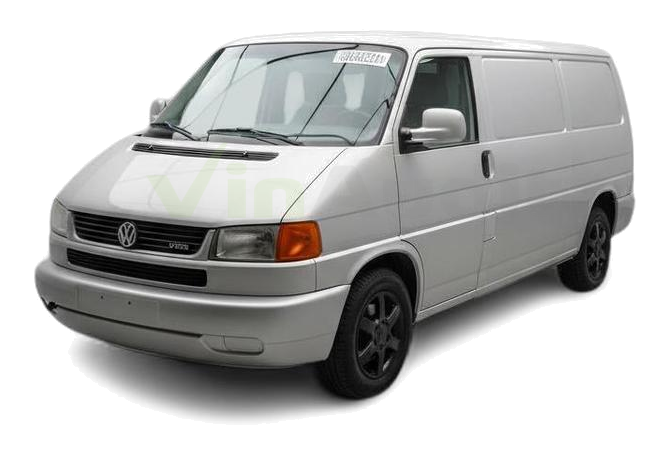The 2001 Volkswagen EuroVan, a descendant of the iconic VW bus, is a versatile passenger van known for its spacious interior and Westfalia camper variants. Produced from 1992-2003 in the US market (with a gap), the 2001 model came in GLS and MV trims. Pricing in 2001 ranged from approximately $26,000 to $32,000. Its standout feature is the combination of European styling and adaptable layout, making it popular for families and adventurers alike.
The Good
The 2001 EuroVan offers a comfortable ride and a spacious, adaptable interior, appealing to practical buyers needing passenger or cargo space. Performance is adequate, and the unique design evokes a sense of adventure, resonating with emotional buyers seeking a nostalgic and versatile vehicle. Its value lies in its potential for travel and recreation.
The Bad
Known weaknesses of the 2001 EuroVan include potential transmission issues, especially in earlier models. Electrical problems and cooling system leaks are also common. Parts can be expensive and harder to find than for more mainstream vehicles. Regular maintenance is crucial to mitigate these issues.
2001 Volkswagen EuroVan: Quick Overview
- Engine Options: 2.8L VR6 engine
- Horsepower: Approximately 201 hp
- Fuel Economy: Around 15 mpg city / 20 mpg highway (estimated)
- 0-60 Times: Roughly 11-12 seconds
- Towing Capacity: Approximately 4,400 lbs (when properly equipped)
- Trim-Level Features:
- GLS: Standard features included air conditioning, power windows and locks, cruise control, and anti-lock brakes (ABS). Seating for seven passengers.
- MV (MultiVan): Added features like a rear bench seat that folds down into a bed, a pop-up table, and swiveling middle seats. Often included a second battery and auxiliary heater. Curtains for privacy.
- Westfalia Camper: (Conversion) Included a pop-top roof with a sleeping area, a small kitchenette with a sink and stove, a refrigerator, and storage cabinets. Some models also featured a built-in auxiliary battery and water tank.
- Transmission: 4-speed automatic transmission
- Drivetrain: Front-wheel drive
- Brakes: Four-wheel disc brakes
- Safety: Driver and passenger airbags
Note: Specific features and options could vary depending on the original configuration and any aftermarket additions.
2001 Volkswagen EuroVan Specifications
Vehicle Information
| Year | 2001 |
| Make | Volkswagen |
| Model | EuroVan |
| Trim | - |
| Style | - |
| Type | Sport Utility Vehicle |
| Category | Cargo Van |
Manufacturing Details
| Made In | Germany |
| Manufacturing City | DRESDEN |
Dimensions
| Doors | 3-Door |
| Curb Weight | - |
| Gross Vehicle Weight Rating | - |
| Overall Height | - |
| Overall Length | - |
| Overall Width | - |
| Wheelbase Length | - |
| Standard Seating | - |
Engine & Performance
| Engine | 2.792000 6 |
| Engine Size | 2.7L |
| Engine Cylinders | 6 |
| Transmission | - |
| Transmission Type | - |
| Transmission Speeds | - |
| Drivetrain | - |
Additional Features
| Anti-Brake System | - |
| Steering Type | - |
Pricing
| Manufacturer Suggested Retail Price (MSRP) | - |
| Invoice Price | - |
| Delivery Charges | - |
Vehicle History Report
Vehicle
Specifications
Specifications
Ownership
History
History
All History
Events
Events
NMVTIS Title
History Check
History Check
Salvage/Rebuilt
Check
Check
Accident
Check
Check
Theft
Check
Check
Open Lien
Check
Check
Past Sale
Listings
Listings
Safety
Recalls
Recalls
Odometer
Check
Check
Market Price
Analysis
Analysis
What Problems Does the 2001 Volkswagen EuroVan Have?
The 2001 Volkswagen EuroVan, while beloved, is known for several potential problems. Transmission issues are common, particularly in earlier years, and can be expensive to repair. Overheating due to cooling system leaks (hoses, radiator, water pump) is another frequent concern. Electrical problems, including issues with the power windows, locks, and instrument cluster, are also reported.
Specific to the 2001 model, check for proper function of the automatic transmission, listening for slipping or rough shifting. Inspect the cooling system thoroughly for any signs of leaks. Examine the undercarriage for rust, especially in areas prone to road salt. Test all electrical components to ensure they are working correctly.
Recalls for the EuroVan, if any, would relate to safety-critical components. Check the NHTSA (National Highway Traffic Safety Administration) website using the VIN for any open recalls. Long-term reliability concerns center on the availability of parts and the increasing age of the vehicle. Maintaining a 2001 EuroVan requires diligence and access to a mechanic familiar with VW vans.
Specific to the 2001 model, check for proper function of the automatic transmission, listening for slipping or rough shifting. Inspect the cooling system thoroughly for any signs of leaks. Examine the undercarriage for rust, especially in areas prone to road salt. Test all electrical components to ensure they are working correctly.
Recalls for the EuroVan, if any, would relate to safety-critical components. Check the NHTSA (National Highway Traffic Safety Administration) website using the VIN for any open recalls. Long-term reliability concerns center on the availability of parts and the increasing age of the vehicle. Maintaining a 2001 EuroVan requires diligence and access to a mechanic familiar with VW vans.
How long will the 2001 Volkswagen EuroVan last?
With proper maintenance, a 2001 Volkswagen EuroVan can realistically achieve 200,000 to 300,000 miles. Years of service depend heavily on care; well-maintained examples can last 20+ years. Long-term durability is affected by rust (especially in colder climates) and the degradation of rubber components. Weaknesses include the aforementioned transmission, cooling system, and electrical issues. Regular fluid changes, timely repairs, and rust prevention are crucial for extending the EuroVan's lifespan. Finding parts may become increasingly challenging as the vehicle ages.
What Technology & Safety Features are Included?
The 2001 Volkswagen EuroVan's technology reflects its era. Built-in tech is relatively basic compared to modern vehicles. Entertainment features typically included a radio (often a cassette or CD player) and speakers. Some models might have had an optional upgraded sound system.
Driver-assistance features were limited. ABS (anti-lock braking system) was a standard safety feature. Power steering was also standard, improving handling. Other than that, the EuroVan relied on the driver's skills and awareness.
Safety features included front airbags for the driver and passenger. Side airbags were not available. Seatbelts were provided for all seating positions. Crash-test ratings for the 2001 EuroVan are difficult to find definitively from standard sources like NHTSA or IIHS. Vehicles of this type and vintage were not always subjected to comprehensive crash testing.
Optional features could include things like a sunroof, upgraded wheels, and various interior configurations (especially with the MV and Westfalia versions). The Westfalia camper conversion added features like a pop-top roof, kitchenette, and auxiliary battery system.
In summary, the 2001 EuroVan offered basic tech and safety features typical for its time, emphasizing practicality and versatility over advanced technology. Its appeal lay in its spaciousness and adaptability, not cutting-edge features.
Driver-assistance features were limited. ABS (anti-lock braking system) was a standard safety feature. Power steering was also standard, improving handling. Other than that, the EuroVan relied on the driver's skills and awareness.
Safety features included front airbags for the driver and passenger. Side airbags were not available. Seatbelts were provided for all seating positions. Crash-test ratings for the 2001 EuroVan are difficult to find definitively from standard sources like NHTSA or IIHS. Vehicles of this type and vintage were not always subjected to comprehensive crash testing.
Optional features could include things like a sunroof, upgraded wheels, and various interior configurations (especially with the MV and Westfalia versions). The Westfalia camper conversion added features like a pop-top roof, kitchenette, and auxiliary battery system.
In summary, the 2001 EuroVan offered basic tech and safety features typical for its time, emphasizing practicality and versatility over advanced technology. Its appeal lay in its spaciousness and adaptability, not cutting-edge features.
What Colors Options are Available?
Exterior Colors
Reflex Silver Metallic
Bright White
Midnight Blue Pearl
Dusty Mauve Pearl
Pastel Green
Interior Colors
Titanium Grey
Grey
2001 Volkswagen EuroVan Prices and Market Value
When new, the 2001 Volkswagen EuroVan ranged from approximately $26,000 to $32,000, depending on the trim and options. Currently, used market prices vary greatly, typically from $5,000 to $25,000+, with Westfalia camper versions commanding a significant premium. Depreciation has been substantial, but well-maintained examples, especially campers, hold their value relatively well due to their rarity and desirability. Factors affecting resale value include condition, mileage, maintenance history, and the presence of the Westfalia conversion. Rust-free examples are highly sought after.
2001 Volkswagen EuroVan Cost of Ownership
The 2001 Volkswagen EuroVan can be costly to own. Insurance costs are moderate, but fuel economy is poor (around 15-20 mpg). Maintenance and repair costs can be high due to the complexity of the vehicle and potential for mechanical issues. Parts availability can also be a factor, increasing repair expenses. Long-term ownership requires a dedicated owner willing to invest in regular maintenance and repairs. It is not an economical vehicle compared to modern minivans.
2001 Volkswagen EuroVan Fuel Efficiency
Fuel Type
Gasoline
Fuel Capacity
-
City Mileage
-
Highway Mileage
-
2001 Volkswagen EuroVan Insurance
Insurance for a 2001 Volkswagen EuroVan is moderately priced, reflecting its status as a Sport Utility Vehicle with strong safety ratings and
reasonable repair costs.
reasonable repair costs.
How Does the 2001 Volkswagen EuroVan Compare to Other Sport Utility Vehicle?
Compared to rivals like the Chrysler Town & Country, Honda Odyssey, and Toyota Sienna of the same era, the 2001 Volkswagen EuroVan falls short in some areas. Performance is adequate but not class-leading. Features are basic compared to the more technologically advanced offerings from Japanese and American manufacturers. Reliability is a significant concern, with the EuroVan being less reliable than the aforementioned rivals.
Price-wise, a used EuroVan can be similar or slightly higher than comparable minivans, especially the Westfalia versions. However, maintenance costs tend to be higher.
Alternatives to consider include:
Price-wise, a used EuroVan can be similar or slightly higher than comparable minivans, especially the Westfalia versions. However, maintenance costs tend to be higher.
Alternatives to consider include:
- **Honda Odyssey/Toyota Sienna:** More reliable, better fuel economy, and more readily available parts.
- **Chrysler Town & Country:** More affordable and with more features for the price, but with its own reliability concerns.
- **Later Model VW Transporter/Caravelle (if available in your market):** Improved reliability and updated features.
Ranks #1815 SUV
| 1 | 2023 Toyota 4Runner | (5.0★) |
| 2 | 2023 Honda CR-V Hybrid | (5.0★) |
| 3 | 2023 Lexus GX | (0.0★) |
| 4 | 2024 Mazda CX-90 PHEV | (0.0★) |
| 5 | 2024 Subaru Crosstrek | (5.0★) |
| 6 | 2024 BMW iX | (0.0★) |
| 7 | 2023 Ford Bronco Sport | (5.0★) |
| 8 | 2023 Mercedes-Benz EQB | (0.0★) |
| 9 | 2024 Chevrolet Trax | (5.0★) |
| 10 | 2023 Audi A4 allroad | (0.0★) |
| 11 | 2023 Hyundai Kona N | (0.0★) |
| 12 | 2023 Nissan ARIYA | (5.0★) |
| 1815 | 2001 Volkswagen EuroVan | (0.0★) |
Final Verdict: Is the 2001 Volkswagen EuroVan a Good Sport Utility Vehicle?
The 2001 Volkswagen EuroVan is ideal for enthusiasts who appreciate its unique character and are willing to invest time and money in maintenance. It's worth buying if you're seeking a spacious and versatile van with a classic vibe, particularly the Westfalia camper version. However, it's not recommended for those prioritizing reliability and low running costs. A pre-purchase inspection by a VW specialist is essential. Look for well-maintained examples with complete service records. Be prepared for potentially higher repair bills and the challenge of finding parts. Consider it a labor of love rather than a practical daily driver.

